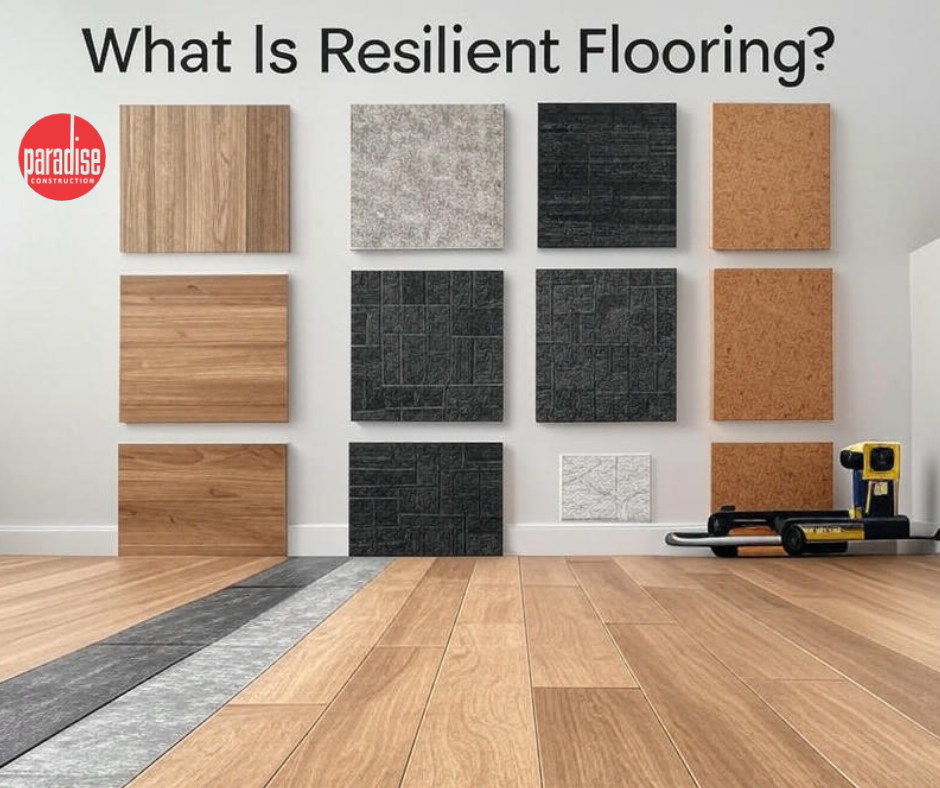Resilient flooring is referred to as a non-textile floor that offers underfoot comfort and bounces back from repeated traffic of compression. This means that resilient flooring can be done on anything that is not carpet, hardwood, stone, or ceramic tile. This type of flooring has more to give, which makes it an ideal choice for everyday life.
Resilient flooring is perfect for both commercial and residential places as owners of both buildings and places want their floors to withstand heavy traffic. Now that you know what is meant by resilient flooring, let’s dive deeper into knowing why it matters, and what are its types!
Why Resilient Flooring Is a Smart Choice
If you’re looking for flooring that’s tough, easy to care for, and doesn’t cost a fortune, resilient flooring is worth a serious look. It handles daily wear and tear like a champ, offers comfort underfoot, and comes in tons of styles. Best part? It works great in both homes and businesses.
So, if you’re planning a renovation or helping a client choose the right material, here’s a quick rundown of the types of resilient flooring you’ll want to consider:
1. Vinyl Sheet Flooring
Vinyl sheet flooring comes in large rolls and is a solid pick for moisture-prone areas like kitchens and bathrooms. It’s budget-friendly, super easy to clean, and available in a wide range of looks from simple to stylish. If you want quick coverage without breaking the bank, this one checks all the boxes.
2. Luxury Vinyl Tile (LVT)
LVT gives you the upscale look of ceramic tile without the cold, hard surface. It’s durable, water-resistant, and easy to replace if one piece gets damaged. Perfect for spaces that see a lot of foot traffic but still need to look sharp like entryways, hallways, or even commercial offices.
3. Luxury Vinyl Plank (LVP)
Love the look of hardwood but not the maintenance that comes with it. Luxury vinyl plank flooring might be your answer. It mimics real wood grain and handles spills, pets, and dropped toys like a pro. Great for families or businesses that want style without stressing over scratches or water damage.
4. Linoleum Flooring
Made from natural ingredients like linseed oil and wood flour, linoleum is a classic with a green edge. It’s biodegradable, tough, and even resists bacteria naturally. If you’re aiming for something eco-friendly and long-lasting with a cool vintage vibe, linoleum’s worth revisiting.
5. Rubber Flooring
Rubber flooring brings serious durability and comfort, especially in spaces where people are on their feet a lot. Think gyms, playrooms, or workshops. It cushions impact, reduces noise, and resists slipping. Plus, it’s easy to clean and holds up well over time even with heavy use.
6. Cork Flooring
Cork flooring feels soft underfoot and naturally insulates against both sound and temperature. It’s made from renewable materials, so it’s a sustainable option too. Just keep in mind that it does need sealing to handle moisture. Still, it’s a cozy pick for bedrooms, offices, or living rooms.
7. Asphalt Tile Flooring
Asphalt tile isn’t as common these days, but it’s still out there in older commercial spaces. It’s durable and cost-effective, though modern vinyl has mostly taken its place. If you ever run into it during a remodel, now you’ll know what it is and why it stuck around so long.
What Are the Advantages & Disadvantages of Resilient Flooring?
Resilient flooring is a go-to choice for busy spaces, and for good reason. It blends durability with comfort, offers a wide variety of design options, and doesn’t require a lot of upkeep. But like any material, it’s not perfect. Here’s a quick look at the pros and cons to help you decide if it’s the right fit for your space:
Advantages:
- Tough and built to handle daily wear and tear
- Easy to clean and maintain over time
- Comes in a wide range of styles, colors, and textures
- Comfortable underfoot compared to tile or hardwood
- Water-resistant, making it suitable for moisture-prone areas
Disadvantages:
- Can dent under heavy furniture or high-impact
- Some types may fade with prolonged sun exposure
- Not all options are fully waterproof (just water-resistant)
- May feel less high-end compared to natural materials like wood or stone
What Is the Most Resilient Flooring Material?
When it comes to durability, luxury vinyl plank (LVP) is one of the most resilient options out there. It resists water, scratches, and dents, and it holds up well in high-traffic areas. Plus, it looks like real wood without the upkeep. Rubber flooring is another strong contender, especially for gyms or play areas. Overall, LVP offers the best mix of style, comfort, and toughness, which makes it a top pick for both residential and commercial use.
Where To Get Resilient Flooring For Your Buildings?
Paradise Construction deals in all kinds of flooring installation services, including vinyl flooring, tile flooring, and even resilient flooring. If you are looking to get resilient flooring done at your place, you can count on Paradise Construction.
Call us at +1 718-238-9191 to book your appointment today!
